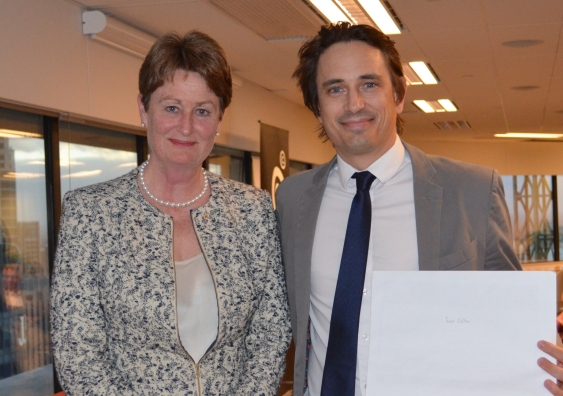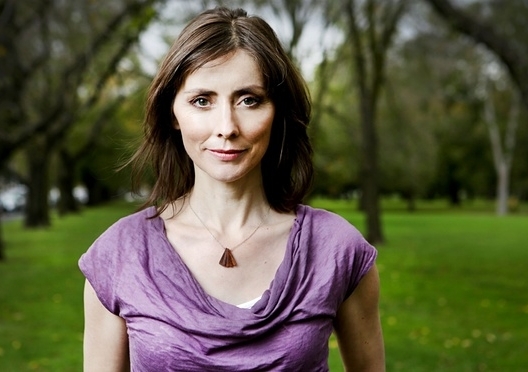The Bragg UNSW Press Prize for Science Writing has been awarded to journalist and author Christine Kenneally for her article The Past May Not Make You Feel Better, about the search for a cure for Huntington’s disease.
The $7000 prize was announced by President of the Business Council of Australia Catherine Livingstone at a ceremony last night hosted by UNSW Press and the UNSW Faculty of Science.
Runners-up prizes of $1500 each were also awarded to author Idan Ben-Barak for Why Aren’t we Dead Yet?, about the immune system; and to The Weekend Australian Magazine journalist Trent Dalton for Beating the Odds, about an artificial pump that can replace a living heart.
The winning works appear in The Best Australian Science Writing 2015, the fifth in an acclaimed series of anthologies published by NewSouth Books, which contain short, non-fiction pieces of writing about science for a general audience.

Catherine Livingstone presents Trent Dalton with his prize as runner-up in the 2015 Bragg UNSW Press Prize for Science Writing
This year’s collection was edited by science journalist Bianca Nogrady, and the Bragg Prize is supported by the Copyright Agency Cultural Fund.
Ms Livingstone said science was critical for health and material wealth and helped people lead fulfilling lives. “Scientific thinking unites humanity, irrespective of any cultural, geographic or historical distinctions,” she said.
Science was particularly important for business: “The businesses that take a scientific approach to decision- making and seize the opportunities that are provided by science and the technologies that come from science absolutely have an advantage.”
Ms Livingstone said this meant businesses required a scientifically literate and engaged workforce, and science writing, including by journalists, bloggers and academics, played a huge role in helping inform society about the latest scientific developments.
She said she was delighted to launch The Best Australian Science Writing 2015. “There is a lot of snackable science content online. Collecting some quality pieces in an annual anthology has become a vital task and these yearly instalments are eagerly awaited. This is a remarkable collection of writing covering a range of science with each piece short and accessible, and interesting and fun.”
UNSW Dean of Science Professor Merlin Crossley thanked UNSW Press chief executive officer Kathy Bail for initiating and sustaining the anthology, the Copyright Agency Cultural Fund for its support, Bianca Nogrady for her outstanding editing, Bragg Prize judges Tanya Monro, Andy Pitman and Carla Catterall for their contribution, and Catherine Livingstone for launching the book.
“The quality of science writing in Australia is extraordinary and the community of writers and, most importantly, readers interested in science continues to grow. The fact that so many Australians care about science makes me very optimistic for the future,” Professor Crossley said.
UNSW President and Vice-Chancellor Professor Ian Jacobs, announced the awards for the inaugural UNSW Bragg Student Prize for Science Writing, an initiative of UNSW Press, UNSW Science and Refraction Media.
The winner, Jessica Kitchen, and a runner-up, Priya Soni, both of Central Coast Grammar School, were present to receive their student awards from Professor Jacobs. The main winner, Christine Kenneally, and student runner-up, Holly Reid, were both unable to attend the ceremony.



